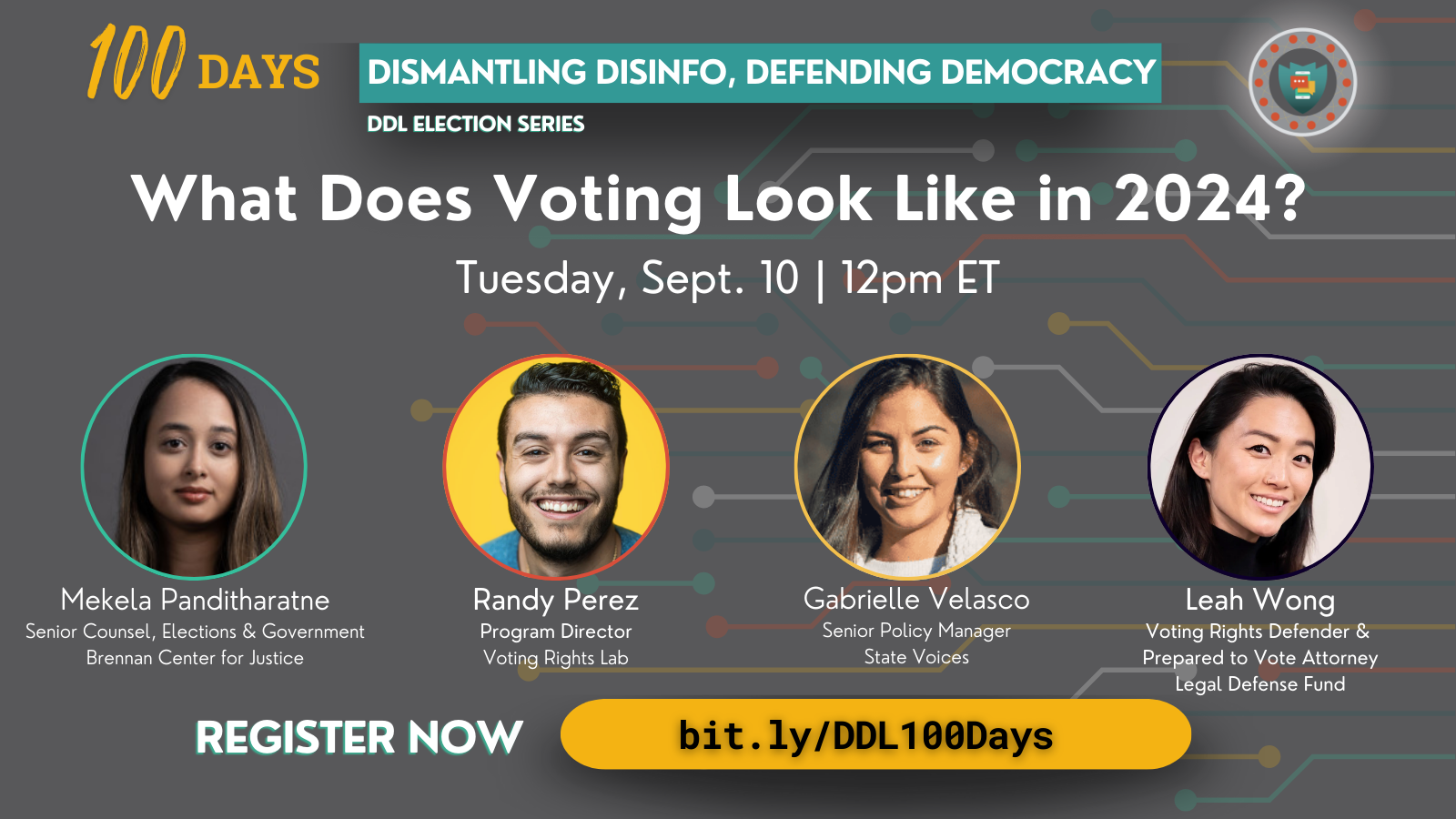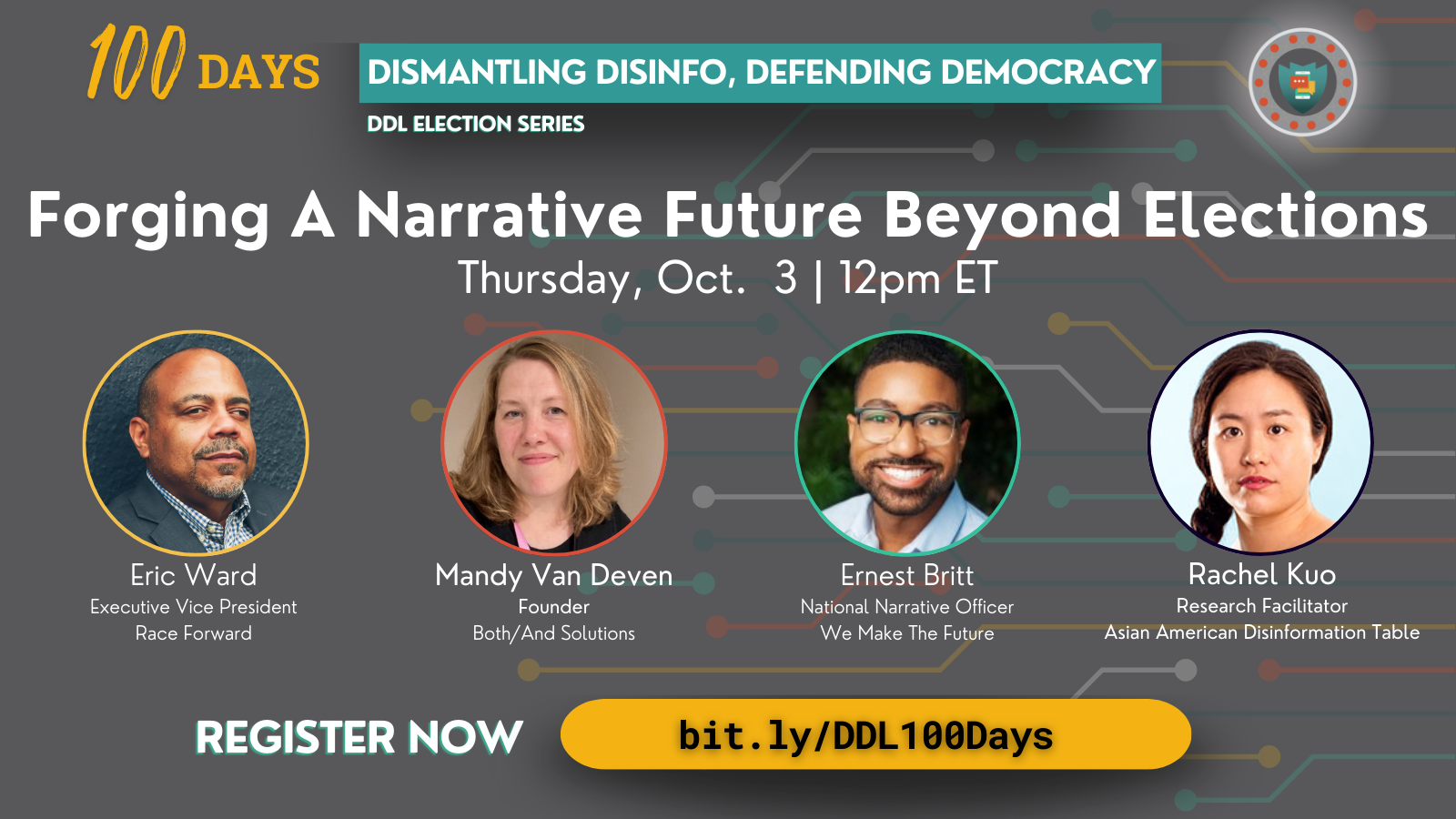100 Days: Dismantling Disinfo, Defending Democracy
Midnight on Sunday, July 28 marked 100 days until November 5, 2024: Election Day. In the face of well-funded projects and plans to curtail our rights, to define our identities, and foreclose our future, Disinfo Defense League is here to help us all dismantle disinformation and defend democracy. Registration for our two-month panel series is now closed. Many thanks to all those who attended.
What Does Voting Look Like in 2024?
Tuesday, Sept. 10 | 12pm ET
Elections in 2022 defied most expectations. There wasn't another national attempt to delegitimize the vote through mis- and disinformation similar to #StopTheSteal. There also wasn't another massive Capitol insurrection aimed at overturning the results of any election.
But election deniers still mobilized across the country. They cast doubt over voting technology and pushed for hand counting, continued to frame mail-in and absentee voting as sources of mass fraud, weaponized recontextualized media, and coordinated on messaging apps.
Most importantly, many used these lies to make the landscape more dangerous for election workers and harder for voters to participate. As we navigate this primary season and head into Election Day, what can we expect are the dangers and risks we will be up against this time around
Words (Alone) Aren't Magic: Message Testing, Reaching Community & Trust Building
Thursday, Sept. 12 | 12pm ET
To strengthen our communities from mis- and disinformation, building trust and being trusted is essential. The words we use matter, but so do the relationships we have with our audience and who our messengers are.
How can we authentically communicate and understand what our audience needs and what is most important to them? What are the biggest pain points that leave them susceptible to mis- and disinformation, and what can we do to successfully fill the causal gaps when correcting false or harmful information or narratives?
In this session, we’ll hear about the most recent message testing trends and what works — and doesn’t — when structuring your own outreach efforts within and outside of your communities. Whether you're looking to enhance your communication tactics or seeking new ways to understand your community, this session offers invaluable insights to elevate your outreach initiatives and build trust.
Election Disinfo Research: disinfo Narratives To Be On The Lookout For
Wednesday, Sept. 18 | 1pm ET
Knowing what the most relevant narratives and claims, in both English and non-English languages, as we get closer to Election Day can make all the difference. In this panel, we will delve into the inner workings and proliferation of election disinformation in our contemporary political, cultural, and media landscape and the infrastructures that enable its spread.
Panelists will share learnings from their research and how that has shaped their understanding of the social web during this election cycle. We will also discuss actionable strategies aimed at curbing the influence through a research, communications, and policy lens.
What's Really at Stake: Mitigating Election Disinformation
monday, Sept. 23 | 2pm ET
Election mis- and disinformation is not simply about contesting who may have won or lost a bid for public office. Election denialism is a means to an end, underpinned by white supremacist principles.
It is this same denialism — a form of conspiracy belief anchored in racial resentment — that fuels regressive legislation that further disenfranchises marginalized voters and chips away at the Voting Rights Act to eventually undermine our voting systems. As we address racialized election mis- and disinformation, we must always keep these and other tangible consequences at the forefront.
We will discuss the larger impacts of election denial claims and the larger goals of those who spread them. The session will also explore how we can prepare our communities with strong information networks to resist and advocate against the racialized disinformation campaigns that seek to influence their political landscapes.
How Civil Society Can Partner With Local media to build narrative
Tuesday, Sept. 24 | 3pm ET
Narratives shape how we understand the world around us and interpret new information. This makes storytelling one of our most powerful tools in ensuring our communities can stand strong against harmful mis- and disinformation.
As advocates, organizers, researchers and academics, we are well equipped to build a compelling story. Often, we know, or are, the people on the ground with the latest data — we know who is spreading disinfo and who they are targeting. This is why it’s so important to get our narratives out to the media.
In this session, we will learn how to be more proactive in engaging and partnering with the press, how to move our messages, and pitch our resources. Panelists will also delve into the newsroom dynamics at play when pitching stories.
Want to Fight Election Disinfo? Here's How.
Tuesday, Oct. 1 | 12pm ET
There are myriad opportunities to get involved in your local election or with organizations working with your community to slow the spread of mis- and disinformation. You can put your disinfo training into action by researching your local information ecosystem, becoming a poll worker to make sure your community has access to choice, and even doing “get out the vote” work.
In this session, we will hear from a diverse set of advocates who are working hard to make it easier for you to get involved.
Forging A Narrative Future Beyond Elections to Counter Racialized Disinformation
thursday, Oct. 3 | 12pm ET
As mis- and disinformation continue to threaten our democracy, we recognize that the effort to address these issues begins long before election cycles and doesn’t end when the polls close in November. Narratives shape our understanding of the world and help us make sense of new information, and we know that disinformation campaigns often tap into dominant narratives in our communities.
We will delve into the narratives that drive racialized disinformation and intervention strategies that transcend electoral periods to effectively strengthen our communities against this pervasive issue.







